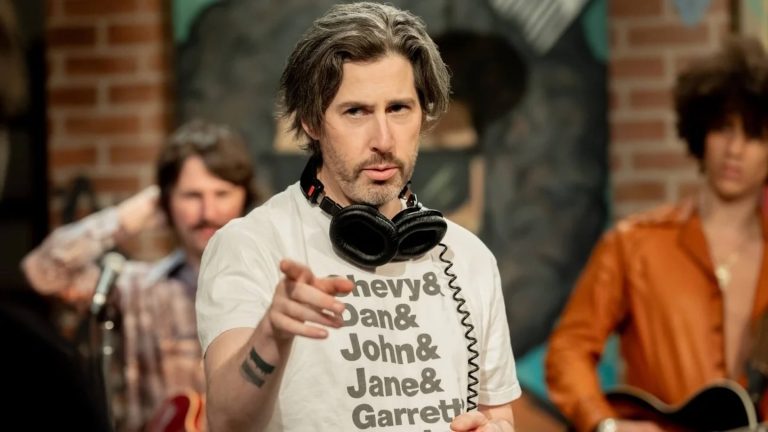
Literary manager Scott Carr made a surprise appearance on a recent episode of The Q&A Podcast featuring the movie Miss Sloane, which was written by Scott’s client Jonathan Perera.
On the episode, Scott spoke about receiving the cold query letter that started it all, how the letter prompted him to request the script, and what made him want to sign a first-time screenwriter as a client -- a risky proposition for any manager or agent. It's well worth a listen for any aspiring writer.
Before founding his own management firm, Management SGC, Scott worked on the agency side (at both William Morris and UTA), and as a development exec (at Hollywood Gang at Warner Bros). Add to that a lifelong love of film catalogued in mind, and Scott definitely has a comprehensive industry perspective to share.
So we asked Scott to answer a few more questions about the evolution of Miss Sloane, and about how he works with his clients to create Hollywood careers.
ScreenCraft: Once you and Jonathan began working together, how much development of the Miss Sloane script did you do before starting to send it out?
Scott Carr: Jonny's first draft was structurally very strong. He smartly used the framing device of the Congressional Hearing to present a dramatic context for the story, and the whip-smart repartee dialogue was crackling from start-to-finish. And his protagonist, Elizabeth Sloane, was already brimming with intelligence, intimidation and ferocity; she was a master tactician and a magnetic character on the page.

My role in the script's development in that vacuum with Jonny, which initially took place from June to November 2014, involved providing him with his first objective feedback on the script, a draft he'd never shared with anyone since he was so far removed from the industry. But, I could tell immediately that Jonny was going to be a pleasure to develop with because he was genuinely eager to get feedback, easy to talk to, and responsive to my thoughts. We just spoke a similar cinematic language, had the same taste in movies, and were both dedicated to telling the best version of this story.
Also, Jonny was so tapped into his script that he had incredible instincts on which notes were most applicable and how to execute them. There's probably too many specifics to get into here, but my contributions were primarily about enhancing Elizabeth's vulnerable side throughout the story, which helped humanize her further (and director John Madden spent even more time drawing this out once he became attached, and made some brilliant contributions to her arc), injecting more cinematic elements into the drama so the script played out more like a thriller, suggesting more ideas for meaningful setup & payoff beats that ran across the scope of the narrative, drawing out deeper characterizations in the supporting roles, and advising on how to increase the stakes so the emotions ran even higher for the characters.

Jonny is a gifted wordsmith and has such innate skills as a storyteller, once he completed that first rewrite, the script only needed a series of targeted polishes and tightening-up to be teed up for further exposure. Once I was satisfied with new draft, I slipped it (without a title page) to five trusted executives around October 2014, and that was the final phase of vetting and feedback, providing that last bit of creative guidance needed to lock the script for the market.
See, when I have a script and writer I feel has the potential to break through the clutter in the market in a big way, I like to do a discreet litmus test with the material, which I also think helps build up the writer's confidence in the work he's done and generate some momentum going into its official exposure, since those favorable reads can result in allies of the material which I can tactically use to the process's advantage when exposing the script.
For instance, as the manager, I'm clearly biased so having advocates who have no direct ties to the material can be a great asset when navigating the market and trying to drum up interest and buzz among agents and producers.

And, regardless of the additional development the script went through with me and the filmmakers thereafter, the initial quality of Jonny's craftsmanship on the page, when it came to the voice, structure, plotting, character work, dialogue, it all had so much going for it from the outset, it made the process of getting it ready for market more a matter of dramatic focus on the page; Jonny's one of those writers who doesn't need to be handheld through development - just give him fresh eyes and some overall guidance, and he'll create and integrate the details that make the next iteration even stronger.
SC: Were you ever interested in producing the project as well, or is that not something you usually consider?
SGC: I do produce certain projects, when I have a deep creative affinity with the subject matter, a clear trust and understanding with the writer, and my role fulfills the requirements I deem truly producorial, resulting in me bringing added value to the page and the process. I've had many people familiar with Miss Sloane wonder why I didn't involve myself as a producer in some capacity, given I discovered the script from virtual obscurity and developed the draft which got all the major elements attached before another word ever changed - but, for me, it really came down to how I could best serve both the project and Jonny.

Once FilmNation approached us about producing, I knew the script was going to be in good hands since the company has such amazing taste and a great reputation with films of this ilk. And Ben Browning and Patrick Chu were dedicated to exposing the draft that Jonny and I developed, and sharing it with top-tier directors and talent, so I felt confident they wanted to make the movie that ultimately Jonny put on the page. I didn't feel like I was going to need to protect the creative quality of the material with these producers on board. So, it now felt like my primary role and key value would be protecting and advising Jonny as he embarked on his first experiences navigating the dynamics, politics and demands of being a Hollywood screenwriter with a script in active development.
This screenplay was not only his first sale, it was the first thing he'd ever written and he'd never set foot in Hollywood, so it was going to be a trial-by-fire process for him and I was dedicated to being his fireproof vest and water hose as much as needed.
Also, for me, FilmNation - and eventually John Madden and EuropaCorp - were so supportive of my history with the project and role in Jonny's life, they enabled me to remain closely involved in the project until its release. I advised on future drafts, went to set in Toronto, participated in the prep and table read, got to see the director's cut and provide my feedback, and was kept informed on the marketing and release strategy.

For me, that speaks just as much to the inclusive and supportive nature of the other people involved, especially Ben, Patrick, Kris and John, as it does to the contributions I got to make along the way. Jonny remained on the project as the only writer and he was engaged in the process until the very end, so my role as his manager kept me plenty busy in 2015 and 2016, as well - especially since Jonny was approached about several other writing assignments during that process and I needed to dedicate my time to advising on those opportunities and helping Jonny balance & serve those priorities & relationships.
SC: What approach did you take, once the script was ready to begin circulating?
SGC: I was trained inside the agency system (first at William Morris, then UTA) so I'm a firm believer in the value added by agents when exposing material to the marketplace, especially with a new writer since the brand equity garnered from a top agency will only enhance the credibility of the material. I knew that as soon as I had a draft I felt was market-ready, I wanted to first approach agents with the script and procure representation for Jonny before going to producers and other elements.
I sent the script to one "tastemaker" agent who I trusted at each of the four major agencies in December 2015. Ultimately, it was Peter Dodd (who I first gave it to at UTA) and Carolyn Sivitz who signed Jonny (along with James Kearney in their TV dept). As an added bonus to landing great representation for Jonny and the material, the script had a big fan in Rowena Arguelles (who I'd sent it to at CAA), and she discussed it with her lit and talent departments and eventually shared it with her director client, John Madden - who was hired to direct the film.

I still don't think I'd put a title page on the script when I'd shared it with the agencies (a measure I often take to protect the writer and script from any passes and the material being identified if it were slipped prematurely to the market), so I remember there was all this buzz over this anonymous script going into the Christmas holidays that year, which only added to the mystique of the project.
By the time we'd exposed the script to producers in late 2014/early 2015 and FilmNation had acquired it, the script already had strong buzz within the packaging agencies. By April 2015, John Madden and Jessica Chastain (who John had given the script to directly since he and Jessica had remained close since they made The Debt in 2010) were attached, and Jonny was on a plane to London to meet with John and discuss further development of the script. By September 2015, the package was acquired by EuropaCorp and the project was put on a progress-to-production track for a February 2016 start in Toronto and DC.
SC: We hear a lot of advice that writers should have multiple samples before looking for representation, but that clearly isn’t a hard-and-fast rule. What do you generally look for in a writer’s body of work when you’re considering working with them?
My most consistent advice is, ironically, not a reflection of the process that unfolded with Jonny Perera, since Miss Sloane was the first script he ever wrote. But, I consider Jonny's situation more of an anomaly than the norm in this business and I don't advocate that writers flood the market with the first draft of their very first script. Mathematically, there's just going to be many more misses than hits.

Thus, I think it's generally helpful for a writer to have written several scripts before even approaching representation, if anything as an exercise in developing their voice, craft, and honing in on a sensibility that speaks to their greatest strengths as a storyteller and writer. Even though representation is generally the gateway to the business, the writing still needs to be strong enough to sustain a career and the essential groundwork needs to be done by the writer on their own time.
When it comes to the number of scripts a writer needs when looking for representation, I recommend leading with just their best one. Frankly, that's all a rep will have time to read at first. And that one script should read like the strongest representation of the writer's taste and writing quality. If a writer effectively procures representation off that script, then, for me, the strategic discussions on the best way for the writer to proceed will follow.
It's impossible for me to define what the process will look like next until I'm in the situation with that writer. Perhaps the script used to sign them won't be the one going to market. Maybe it needs further development before it can, like with Miss Sloane. If they have other material they are proud of, I'd ask for loglines and pitches, and read the ones that sound viable and interesting, and perhaps it's one of those scripts that eventually leads the charge. Or maybe we generate a brand new piece of material after a series of discussions about the writer's interests and how they marry to the marketplace.

The ultimate goal of all this is to have one fantastic script that's indicative of a fresh voice, well-drawn characters and strong execution. If the premise is saleable, that's certainly preferred but not integral, as the first script is all about establishing the quality of their voice and writing.
However, I do think it's important to be prepared for that inevitable first question if people like the script, which is: what else do you got? In response to that, I prefer a writer has at least one strong idea they can discuss in general meetings, if not more.
The goal is to proactively capitalize on any momentum off that first script so there's a greater possibility to generate new business with producers or whomever wants to meet. I encourage all writers to be generating new ideas and material as much as possible, and as time permits, so they can keep at least one hand on the wheel in crafting their own brand of storytelling.
But, the reality is that once they are established off their first script, assuming it's strong enough to position him/her as a hireable writer, there will be more opportunities and a greater likelihood to monetize their writing by going after assignments than from selling specs. Spec scripts serve their greatest purpose early in a career when a writer has no choice but to write for free.

Once established, spec material will need to be more carefully conceived and put together since a writer will no longer be exposing material primarily as a writing sample - the goal now is to prove to the market that a writer creates market-worthy content, and the spec market isn't what it used to be when naked scripts could be sold quickly for a lot of money. Now it's more about strategically exposing spec material such that the necessary elements are put together to best position the script to not only sell, but get made quickly.
Each year an exposed spec script goes unproduced, the greater the odds are that it'll never get made; these specs generally don't serve the same value for an established writer, when results are measured by conversion to screen more so than just script sales. This means the tactics and timing of exposing a new piece of material is essential to its momentum and perception as a produceable script.
So, a feature writer's career becomes a careful balance of taking assignments - thus enhancing relationships through project-specific work, getting paid upfront for their services and in turn increasing their value as a professional writer, and getting more volume into the development space - while smartly teeing up original material and pitches with the proper elements so they can best position new projects to get sold and made. And, for TV writers, it's an entirely different strategy altogether.

SC: What’s the most common mistake or faux pas you see aspiring writers making? e.g. maybe something to do with what they’re writing, how they’re writing it, or how they’re going about getting noticed.
SGC: Based on my experience with writers looking to break into the industry, I see too many of them exposing material that frankly isn't ready to be read by industry professionals.
Now, it's highly unlikely everyone who sets out to be a paid screenwriter will become one, as some writers just don't have the necessary talent to ever break-in on that level. But, there are writers who have the potential yet choose not to develop it enough before using of their relationships or the internet to get their material out there in some capacity.
The access to the industry has never been simpler, be it email queries, screenplay websites like The Black List site, or screenwriting contest - most of which are about generating profits and then need to grade on the curve and assign winners who aren't necessarily on the level of the industry's requirements.

I suggest, to counter this premature exposure of material, writers read the industry's top-ranked specs of the last 5 years, as well as the screenplays for movies they admire, so they can assess the level of writing quality needed to stand out. Then they'll have a clearer sense of what the bar is, on the page itself. And once a writer has dedicated serious time and effort to reading scripts, writing scripts, sought out whatever education serves their process, and broken well past the point of those cursory insular drafts, they should seek out honest, actionable feedback on their material before they start exposing it to representatives.
That may require submitting it to a professional script consultant, building a network among assistants and interns in Hollywood who can help advise or get the material covered, or just having friends read the scripts and give honest layman feedback. Timing is everything with a career and to attempt getting traction without being ready to sustain it from jump street, will only be a disservice to a writer's potential momentum and can be very discouraging, even damaging, if the feedback from reps suggests the writer just doesn't have what it takes on the page to stand out yet. It's best to first hear that kind of thing from trusted relationships or paid consultants and not as the solicited feedback from representatives, as there's often only one bite at the apple with most of us.
So, be patient, do the work, get feedback, revise, get feedback, revise, get feedback, then - when it's finally ready - trust your instincts and your efforts, and make that first contact with the industry really count. I only want to read material where the story and its elements feels baked-in and lived-in.

SC: If you could go back in time to share one piece of industry knowledge or wisdom with the just-starting-out you, what would it be?
SGC: The importance of networking and being a contribution to the industry. I came to Los Angeles from a small rural community in Canada, and I had no idea how important relationship building is to sustaining a career in Hollywood. I first thought it was a meritocracy and all I needed was desire & talent and then everything would just fall into place.
Of course, you do need to be talented and driven at whatever it is that you're here to do, but it's the courage to seek out new relationships, the ability to develop them, and the humility to serve them, that will make it possible to navigate this industry with greater success. It's a team sport. So, it's about being interesting AND interested. The reciprocity of relationships will fuel the momentum necessary to become an asset.
When I first came to this town, it was about 'me'. Yet, what enabled me to make real headway in my career was when I made it more about 'we'. And what's made my career sustainable everyday since, is that it's genuinely now become about 'them'. Because 'them' still has 'me' in there, but if I'm not focused on serving the needs of others, there's greater risk of me not adding real value to my relationships. And it's always about adding value. Always.

Get Our Screenwriting Newsletter!
Get weekly writing inspiration delivered to your inbox - including industry news, popular articles, and more!


























